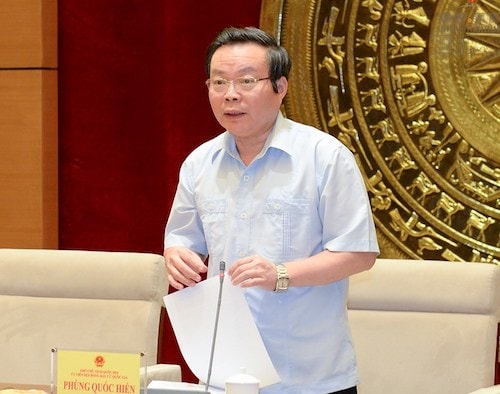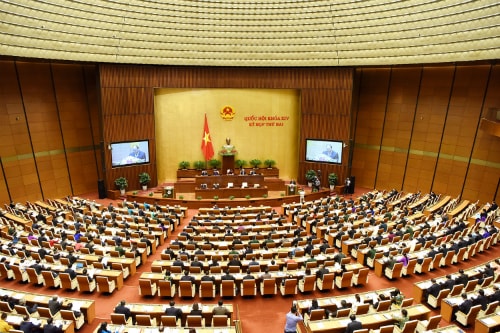Vice Chairman of the National Assembly: The National Assembly is open to welcome voters to watch live
Mr. Phung Quoc Hien said that the National Assembly will have many innovations in the coming time, specifically: Encouraging debate in the hall; live broadcasting all working sessions; opening doors for voters to observe directly...
Vice Chairman of the National Assembly Phung Quoc Hien discussed this issue.
- How do you view the issue of innovation in parliamentary activities?
- The Vietnamese National Assembly has been 70 years old since the first general election. Compared to the history of world parliaments, it is not that long, for example, the British Parliament was established in 1707, the Japanese Parliament in 1889..., that is, hundreds of years.
We innovate parliamentary activities on the basis of selectively referring to international experience, and importantly, drawing lessons from previous terms to help the National Assembly better and better fulfill its mission in the fields of legislation, supreme supervision, and decision-making on important national issues. In particular, the National Assembly must go all the way in supervision, to force individuals and organizations to strictly implement the will of the highest state authority.
To do that, the National Assembly must ultimately mobilize the intelligence of delegates, managers, scientists, experts and the entire population. In addition, innovation in parliamentary activities must be in the direction of openness and transparency, because the National Assembly is the highest representative body of the People, so the people must know.
 |
Mr. Phung Quoc Hien emphasized that the National Assembly must mobilize the intelligence of all people. Photo: QH |
- With the idea of a transparent parliament, the German Parliament building is designed with a transparent dome, so that voters and visitors can see the main meeting room. What do you think about the idea of allowing Vietnamese voters to observe the National Assembly sessions?
- In the 1990s, the National Assembly televised question and answer sessions, which was a major innovation, followed by live televised discussions on socio-economic issues and a number of other important issues.
In the coming time, except for the contents of state secrets, all the remaining working sessions of the National Assembly will be broadcast live for voters to follow. And of course, the National Assembly will open its doors to welcome voters to observe the working sessions. Why not? Of course, when voters enter, sit on the upper floor and observe the Dien Hong Hall - the main meeting room of the National Assembly building, security and order must be ensured.
- In your opinion, what specific tasks need to be carried out to continue innovating the activities of the National Assembly?
- There are many tasks that need to be carried out synchronously, both in the short term and in the long term. One of the important steps now is to further improve the quality of the activities of the Nationalities Council and the committees. For example, the draft law that the Government presents, the National Assembly will consider, but which agencies will help the National Assembly examine and provide data for discussion, that is the work in the meeting rooms of the committees.
Another thing is to improve the way of discussion in parliament. Normally, delegates express opinions in a “one-sided” way, with few people exchanging or arguing, while if there is a debate, the issue can be clarified and right and wrong can be determined.
 |
The National Assembly encourages debate in the hall. Photo: Giang Huy |
Delegates will "raise signs asking for debate"
- As Vice Chairman of the National Assembly, when presiding over working sessions in the parliament in the field you are in charge of, will you create conditions for delegates to debate?
- Of course. There are debates between delegates, between delegates and members of the Government, and ministers have the right to discuss and explain issues of concern to delegates, because not everything that a National Assembly delegate says is correct. Debate is to clarify the issue, there may be different opinions, then the National Assembly will reach a consensus and express the majority will by voting. This is an issue that I consider extremely important. Debate openly, express all opinions, go to the end of the issue, but must ensure parliamentary culture, debate culture, be constructive, opinions are not for personal interests.
- It is expected that in addition to registering to speak by pressing the electronic button, delegates can raise their ballots to debate. Can you provide more information about this?
- During the National Assembly session, because the electronic buttons are the same, the chairperson sitting above does not know whether the delegate is registering to speak normally or to debate. Therefore, there is a proposal to design a sign next to the button requesting debate.
The Secretary General of the National Assembly has already made those signs, clearly stating the seat numbers of the delegates, so that when the delegates raise them, the chairperson will recognize that they want to participate in the debate. The presidium, while conducting the session, will harmonize between normal statements and debate opinions, so that the session can be more in-depth.
- Up to now, delegates have only pressed the button to register to speak normally. Now, with the addition of a debate section, will it affect the working time of the National Assembly?
- This session has increased the time for socio-economic speeches from one day to two days, and the time for budget discussion from half a day to one day.
There is a problem here, as a National Assembly delegate, you have to express your opinion and have the right to express that opinion. But in the session, I registered to speak but when it was my turn, the time was up. How should we resolve this? Can the working time be extended? For example, the afternoon session usually ends at 5:00 p.m. If after the time, there are still delegates pressing buttons or holding signs, the National Assembly will continue working until all opinions are finished.
There are many different opinions on this issue. In many countries, it is normal for the National Assembly to meet until 11am or 12am. For example, I just went to Finland, the National Assembly was preparing to pass a resolution on the budget, it met from 9am and was expected to finish by 10pm.
When asked why it took so long, they explained that this content was “certainly discussed a lot, and the meeting would last until there were no more opinions”. That is, the meeting would last until the work was done, not until the time was up. The National Assembly could adjourn early or adjourn late, the important thing was that the work on the agenda was thoroughly resolved, reaching a high level of consensus.
According to VNE
| RELATED NEWS |
|---|
